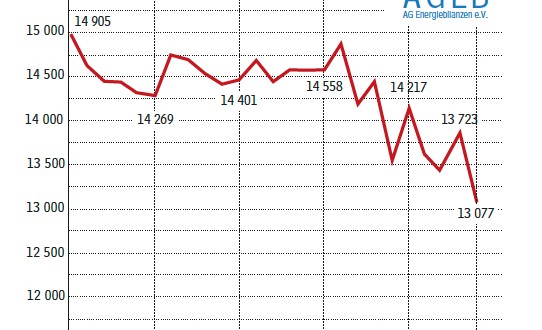Last year’s mild weather caused energy consumption in Germany to fall significantly. The Working Group on Energy Balances (AGEB) published its report on energy consumption in 2014, and the findings confirm the forecast made at the end of last year: compared to 2013, overall domestic energy consumption in Germany fell by 4.7 % to 13,077 PJ, or 446.2 million tonnes of coal equivalent (Mtce). This is the lowest rate of energy consumption since German reunification. With the exception of renewable energies, consumption of all energy sources experienced some degree of strong downturn.
Petroleum declined moderately overall, dropping a solid 1 % to 4,577 PJ or 156.2 Mtce. The weather-induced decline in sales of heating oil contrasted with growth in naphtha and all fuels. Natural gas consumption dropped by nearly 13 % to 2,674 PJ or 91.2 Mtce. The developments were largely the result of temperatures being much higher during the heating season than they were the previous year. Overall consumption of black coal fell by about 8 % to 1,647 PJ or 56.2 Mtce. The decline is mainly due to the increasing role that renewables are playing in electricity generation. Lignite consumption dropped by nearly 4 % to 1,572 PJ or 53.6 Mtce. A series of overhauls led to a decline in its use in power plants, putting lignite electricity generation about 3 % below the previous year’s levels. Nuclear energy’s contribution to supply remained almost unchanged, as no more plants were taken offline in 2014. Renewable energies grew just slightly in 2014. Use of renewable resources rose by 0.5 % to 1,453 PJ or 49.6 Mtce. Wind power recorded an increase of 8.2 %, while photovoltaics experienced stronger growth of 12.6 %. By contrast, hydropower (excluding pumped storage) declined by nearly 11 %.
Domestic energy production grew by 3.2 % in 2014, reaching 3,880 PJ or 132.4 Mtce. Germany’s production of fossil resources declined overall, but renewable energies saw growth of 0.5 %. The strong downturn in total consumption caused the share of imports in Germany’s energy supply to sink slightly to 70 % overall.
Electricity generation fell by 3 % to 614 billion kWh (gross). Although electricity generated by conventional energy sources declined across the board, renewable energies grew by a substantial 5 %. Domestic electricity consumption dropped 3.5 % to 578.5 billion kWh.
The Working Group on Energy Balances calculated that energy-related carbon emissions fell by a good 5 % (roughly 40 million tonnes) last year. This was partially thanks to the good weather (AGEB/Si).

